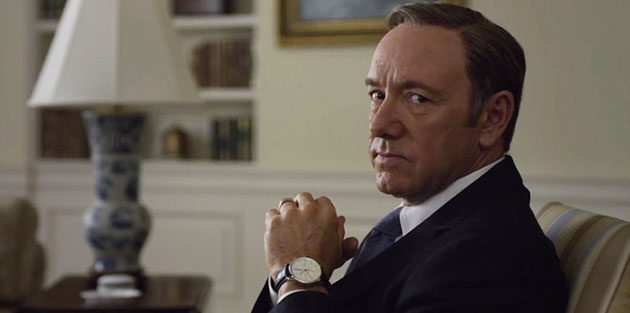A Libertarian Frank Underwood by Elijah O’Kelly
If you’re involved or even interested in politics and haven’t heard about House of Cards, then it’s likely that neither you nor your friends own a TV, a tablet, or a smart phone.
The series, one of Netflix’s new in-house production, portrays the ruthless, power hungry politician Frank Underwood. In addition to its critical acclaim, it has become a staple in the conversations of political activists everywhere. Watching as a libertarian, his nearly every action is reprehensible. Underwood acts solely to increase his own power, never shying away from doing immoral things, and he consistently pushes legislation that increases the scope of government. He is a libertarian nightmare. And yet we can’t help but be entranced by him.
But what if Frank Underwood was a libertarian? At first thought, the idea is a complete paradox. His blatant acts of aggression and his vision of power as an end rather than a means are contradictory to the underlying principles of libertarianism. Yet if Underwood viewed power as a means to accomplish libertarian policies rather than an end to satisfy personal desires, it wouldn’t be so easy to despise him. A plethora of valid critiques can be launched at him, but it is indisputable that he has a talent for getting things done.
Imagine if instead of education and entitlement reform, Underwood had pulled strings, twisted arms, and manipulated politicians in order to pass something like a repeal of the Federal Reserve Act or a decriminalization of drugs. It might be hard for libertarians to be smug. The bottom line is that Underwood’s talent for increasing his own power could be very effective if modified and applied by a real life counterpart trying to create libertarian change.
A mental exercise like this doesn’t typically mean much in reality, but the truth is that it offers insight into the current direction of the liberty movement. There are two main methodologies that people subscribe to for creating libertarian change. One seeks to rely mainly on educational efforts, sometimes even abstaining from voting or any political activity, to create gradual change towards a freer society. The other emphasizes political activism to sway elections and build alliances with different groups in order to pass libertarian legislation. Both are vital for a movement and some libertarians effectively use a combination of both approaches. But if we picture the effect a libertarian Frank Underwood could have on the direction of the country, the superior approach becomes obvious.
As unfortunate as it is, government bureaucrats and their cronies won’t change their behavior because they get handed copies of Human Action. Politicians won’t begin following the Constitution because they got mailed a pocket-sized version of it. The government will continue to pass legislation violating everything libertarians stand for until someone has enough power to stop it. Gaining and keeping this power may very likely entail manipulative schemes to thwart more statist peers. It may be contrary to what every libertarian, myself included, wishes the situation could be, but a failure to “play the game” means a failure to make change.
Envisioning a figure like a libertarian Frank Underwood makes it clear what the impact of a master politician who pursues libertarian legislation could be. This isn’t to suggest that all libertarians must attempt to emulate Underwood or that those in politics should try to mold themselves into replicas of him. But questions about purity—doctrinal or otherwise—rarely touch on how the sausage gets made. At some point, some libertarians are going to have to get their hands dirty.
There are, of course, limits to this. Underwood the character commits acts of inhumanity that no amount of legislative achievement could justify and that no honest libertarian would participate in. There are also worries about the corruptive nature of power and if a libertarian could actually avoid succumbing to its temptations. After all, how much of one’s soul must be sold off to achieve such heights of power? In a reality that television writers don’t have to face, a libertarian Underwood might be impossible. Yet, for those who dare to fight the beasts in their own lair, taking a cue from Underwood and outfoxing politicians could lead to enormous gains for libertarian causes. And so the question becomes: What ends justify what means? Or, where on the continuum has the libertarian politician gone too far?
The extent to which a libertarian Frank Underwood deserves our support has no simple answer, but it’s a question we have to ask ourselves as we begin to aspire to political offices. In any case, we cannot dispute that a willingness to “play the game” is absolutely vital if the Liberty Movement has any hope of moving out of the Internet’s basement and into the statute books.
ABOUT ELIJAH O’KELLEY
Elijah O’Kelley is currently interning with Young Americans for Liberty (YAL) where he works to spread the ideas of liberty on college campuses.


